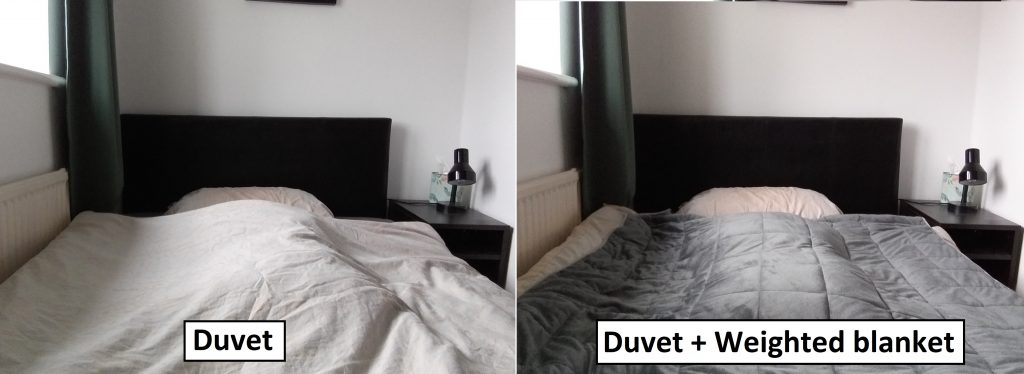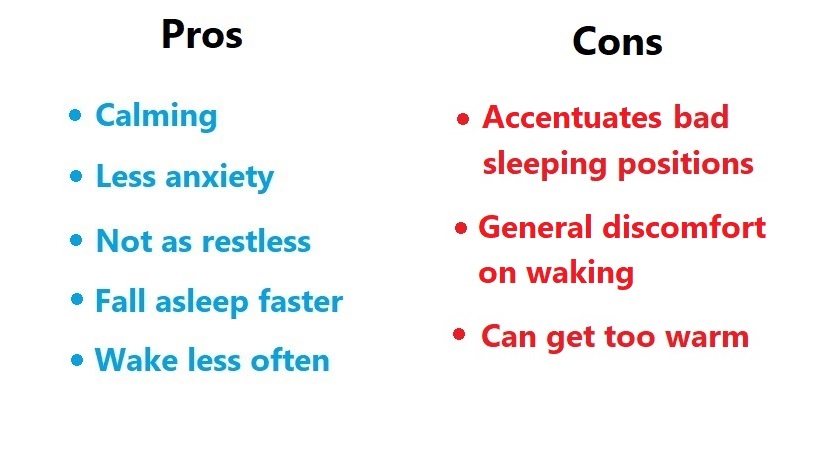I’ve had trouble sleeping in the last few months and after searching online I discovered something called a “weighted blanket”. I purchased one and spent 30 nights with it to see if it can improve my sleep (spoiler: it worked!).
The Blanket
A weighted blanket is exactly what it sounds like – a blanket that weighs much more than your average duvet. It’s commonly marketed as a “gravity” or “anti-anxiety” blanket, and the weighted blanket I purchased was £43 on Amazon.

How heavy should a weighted blanket be? Most retailers suggest buying a blanket that is 10-12% of your body-weight. At 72kg I opted for one which is 6.8kg, slightly lighter than the recommendation.
The Science
One research paper [1] tested a 30lb (13.6kg) weighted blanket on 32 participants ranging from 112-234lbs in weight (51-106kg).
26 of the 32 subjects felt the pressure of the blanket was “good” while only one person considered it too heavy. The study also involved monitoring everyone’s blood pressure, heart rate and blood oxygen to confirm that the blanket is not causing undue harm.

Their results showed 25 of the 32 subjects enjoyed the anti-anxiety effects of the blanket. Other reported benefits of a weighted blanket have been listed above.
The general idea is that the downward pressure on your body has a calming influence on you, almost like getting a nice reassuring hug. It’s quite common to purchase them for anxious children as the hug-like pressure can really help with their troubled sleep.
My Experience
I immediately benefitted from its use and from the first night I could feel a positive impact on my sleep. The first benefit I noticed was how it actually influenced my thoughts, allowing me to be calmer and less anxious. It’s a slightly surreal experience but I could have the same negative thought process as usual, but without it being tinged with anxiety. I imagine it’s a milder version of the effect that anti-anxiety medication has on people.
My habit of tossing and turning throughout the night was reduced, but not eliminated. The increased effort required to shuffle under the blanket made me more likely to stay in place. I believe a slightly heavier blanket could stop it altogether and I should have aimed closer to the 12% of bodyweight range.
The reduction in anxiety allowed me to fall asleep faster and the blanket also helped me wake less frequently in the middle of the night. What started as 30 to 60 minutes in bed trying to sleep was cut down to around 15 minutes on average. My night waking was typically 60 to 90 minutes and that was also reduced to 30 minutes or less.

As for how I set it up, I trialled this in October where average temperatures were 12°C. I placed the weighted blanket directly on top of the duvet, which was slightly warmer but not uncomfortable. During the summer I switch to just a duvet cover with the blanket on top, and in extreme heat it’s not possible to use it.

Here’s a quick summary of the pros and cons of the blanket from my 30 day trial. As you can see there are some drawbacks to its use. If you’re someone who tends to fall asleep in awkward positions then adding pressure to that will accentuate any aches and pains you might wake up with. You can tell first thing in the morning that you have slept with a weight on you, but that disappears in the first half hour of the day.
Overall I highly recommend a weighted blanket if you’re experiencing trouble sleeping. Personally I feel a heavier blanket is the way to go, closer to 12% of your body-weight will ensure sufficient downward pressure to reap all of the benefits.
Here’s my video review:
Other Resources
While a weighted blanket is a very useful sleep aid, there are many others. Rather than list them I can recommend the book Sleep Smarter, which I’ve reviewed on this site. This highlights other quick wins like installing black out blinds and eliminating caffeine before 2pm.
I’ve since found that meditation can also help with anxiety, and the rushing of thoughts the second your head hits the pillow. With all the mental stimulation we bombard ourselves with from the moment we wake up, it’s sometimes only when we lie down at night that we get a chance to process everything. By setting aside 5 to 10 minutes each day to sit peacefully and “check in” with yourself, you can help quiet your mind at night.
I hope you found this review useful and it brings you closer to the peaceful sleep that we all deserve.
[1] Exploring the Safety and Therapeutic Effects of Deep Pressure Stimulation Using a Weighted Blanket, Mullen et al. (2008)

